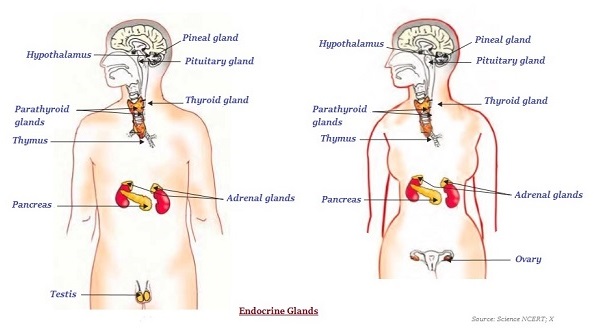
- Biology - Home
- Biology - Structure and Functions
- The Fundamental Unit of Life
- Biology - Tissues
- Biology - Animal Tissue
- Diversity in Living Organisms
- Biology - Plantae Kingdom
- Biology - Animalia Kingdom
- Biology - Vertebrata
- Biology - Transportation in Humans
- Biology - Transportation in Plants
- Biology - Excretion
- Biology - Control and Coordination
- Biology - Hormones in Animal
- How do Organisms Reproduce?
- Biology - Sexual Reproduction
- Biology - Reproduction in Animals
- Reaching the Age of Adolescence
- Biology - Heredity and Evolution
- Biology - Life Processes
- Biology - Respiration
- Microorganisms: Friend and Foe
- Biology - Why do We Fall Ill
- Biology - Natural Resources
- Biology - Our Environment
- Conservation of Plants and Animals
Biology - Hormones in Animal
Introduction
Human body has different glands (as shown in the image given below) that secret Hormones (liquid substance), which are essential for the different body functions.

Adrenaline Hormone is secreted from the adrenal glands. It is secreted directly into the blood and then carried to different parts of the body.
On the other hand, plants have hormones that control and regulate their directional growth.
Iodine is essential for the thyroid gland that makes thyroxin hormone.
Further, Iodine is an essential element for the synthesis of thyroxin.
Deficiency of Iodine, that might cause goiter.
The term goiter refers to the abnormal expansion of the thyroid gland (resulting into swollen neck).
Thyroxin Hormone regulates carbohydrate, protein, and fat metabolism in the body and provide the best balance for body growth.
Growth hormone, which is secreted by the pituitary gland, regulates growth and development of the body.
The deficiency of growth hormone in childhood causes dwarfism short height.
During the age of 10-12, there are certain physical change in the bodies of children, which is caused by the secretion of testosterone in boys and oestrogen in girls.
As shown in the image given above, it is significant difference between male and female body i.e. males have testis (secretes Testosterone Hormone) and females have ovary (secretes Oestrogen Hormone).
Insulin is a hormone, which is produced by the pancreas and helps in regulating the sugar levels of blood.
If insulin is not secreted in proper amounts or on a proper time, the sugar level in the blood rises, which may cause different harmful effects in the body.